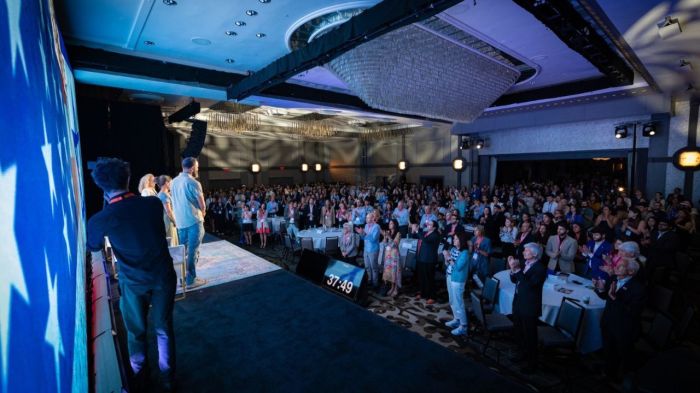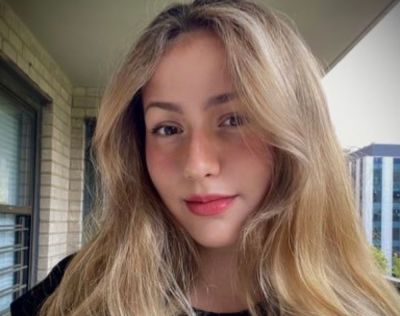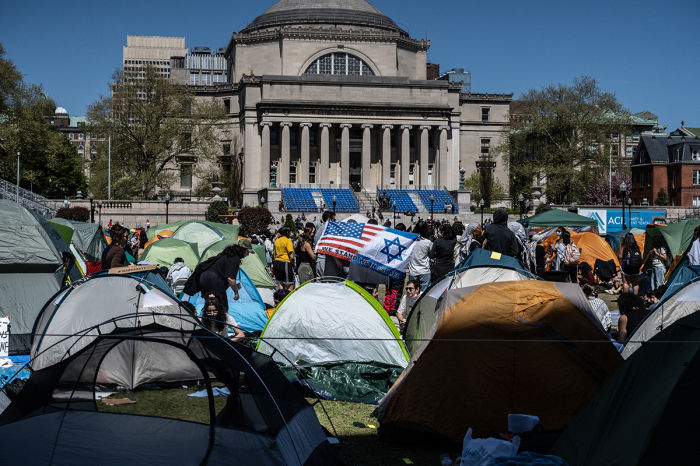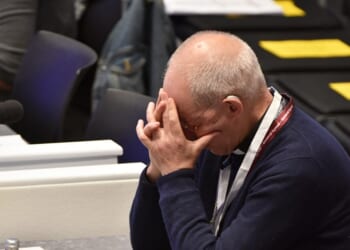
WASHINGTON — Shoshana Aufzien was studying for her finals on May 7 in the Butler Library at Columbia University in New York City — her usual study spot — when she heard shouting and was soon to be disrupted by dozens of anti-Israel protesters who stormed and took over the reading room.
She happened to be seated near the doorway. So she took out her phone and began to film as the activists screamed into their megaphones and repeatedly refused requests from public safety officers for them to leave.
One video of the Butler Library protest shared on social media shows multiple keffiyeh-clad demonstrators yelling chants and pounding on drums. Another video shows an anti-Israel spray-painting “Learn From Palestine” on the library shelves.
The demonstration, which resulted in activists injuring at least two public safety officers, was one of many protests against the Jewish state that Aufzien witnessed during her freshman year.

Aufzien, 19, who identifies as a Modern Orthodox Jew, is an incoming sophomore at Barnard College, Columbia University’s sister school. Before her freshman year began, Aufzien was aware that Jewish students had concerns about how Columbia University and its affiliate school addressed antisemitism on campus.
While living in New York, Aufzien witnessed from afar the encampment that anti-Israel activists set up in protest of Israel’s military operations in Gaza in response to the Hamas-led terrorist attack on Oct. 7, 2023. The encampments garnered media attention as multiple reports surfaced of demonstrators harassing Jewish students, who were advised to return home until conditions on campus improved.
Still, Aufzien refused to let these reports deter her from attending Barnard College.
“I don’t think antisemitism should ever be a deterrent,” Aufzien said in an interview with The Christian Post last Tuesday as she attended the Israel on Campus Coalition’s National Leadership Summit. “If you acquiesce to the demands of antisemites, that’s the worst approach.”
“If you want to have a seat at the literal and proverbial table, then you have to have a foot in the door,” she added.
The National Leadership Summit featured remarks from various politicians and advocacy leaders, including Mike Huckabee, the U.S. ambassador to Israel. During the summit, student leaders had the opportunity to improve their understanding of Israel and the Middle East while strengthening their ability to communicate about these issues on campus and in their communities.
Aufzien is the public affairs co-chair of the bipartisan group Columbia Aryeh, a pro-Israel organization that offers Columbia students the opportunity to connect with Israel through various programs, including academic and philanthropic ones. She believes it’s important for Jewish students to attend institutions where antisemitism is present to engage in productive debates with their peers.
‘Takes a toll on your psyche’
As a Jewish student who’s unashamed of her support for Israel, Aufzien says she has been targeted by anti-Israel activists given her involvement with student groups like Columbia Aryeh.
“I’ve been doxxed more times than I can count,” the student told CP. “I have a lot of classmates who will literally refuse to speak to me in class. It takes a toll on your psyche, I’m not going to lie.”
At one point during her freshman year, Aufzien says anti-Israel activists disrupted a class taught by an Israeli professor and distributed flyers showing a boot pressing down on a Star of David. The student described the flyers as “reminiscent of Nazi-era propaganda.”
For Aufzien, seeing her fellow students deny or justify the atrocities Hamas committed when it attacked southern Israel almost two years ago prompted what she described as a “visceral” reaction. The morning of Oct. 7, 2023, Aufzien was in Jerusalem for a religious seminary when Hamas terrorists slaughtered at least 1,200 people, mostly civilians, and took around 250 others hostage.
On the day of the massacre, the Aufzien woke up around 6 a.m. to the sound of sirens. Aufzien had visited Israel before, so she knew the sirens were a warning to take cover in a bomb shelter, and she quickly roused her roommates.
The apartment building Aufzien shared with her roommates had a reinforced room, so the group took shelter there just to be safe.
“Usually when a siren sounds, it’s just a one-off. But there were sirens in rapid succession, so I knew something was happening,” Aufzien said.
“I knew there was some sort of attack, but we didn’t know the scope of it,” she explained. “We assumed it was only a few people who were affected. And then it just hit you like a ton of bricks all at once. The holiday was over. Our phones were inundated with information.”
“I think every Jew in the diaspora knows someone who was injured, killed or otherwise impacted by October 7,” Aufzien said. “When one person grieves, the entire country grieves.”
During her next few months in Israel, Aufzien volunteered at Israeli military bases and worked on farms. These experiences, she said, reinforced her love for Israel and appreciation for the Israeli Defense Forces. Aufzien has many friends who are currently in the IDF, and one of her best friends is serving in the women’s combat unit.
In the summer of 2024, Aufzien returned to the United States to start school at Barnard College, where she continues to advocate for the Jewish State and engage with those who disagree.
‘There’s a lot more to be done’

Earlier this month, President Donald Trump’s administration announced that it had reached a deal with Columbia University to address violations of federal civil rights laws and ensure student safety. Columbia University agreed to pay the United States around $200 million to settle claims about discriminatory practices, reinstating most of its terminated federal grants.
The university will also pay over $20 million to address allegations of employment discrimination against Jewish faculty after the Oct. 7, 2023, Hamas attacks in Israel. In addition, Columbia University agreed to employ several measures to enhance campus safety, such as maintaining trained security officers and prohibiting masked protests.
Aufzien called the agreement a “step in the right direction,” but said it’s not a “panacea.” She praised Columbia University for disciplining around 80 students who participated in the anti-Israel encampment and the Butler Library takeover.
“But there’s a lot more to be done,” Aufzien stated. “I’m cautiously optimistic.”
The incoming sophomore asserts that the university’s response to antisemitism wasn’t strong enough at first, but she believes many administrators recognize that antisemitism is an issue on campus.
Aufzien thinks that a reason the anti-Israel protests following Hamas’ attack persisted for as long as they did is because Columbia University was trying to appease both the anti-Israel activists and the Jewish students who felt threatened.
When asked for comment, a Columbia University spokesperson directed CP to a statement announcing the steps the institution has taken to address antisemitism.
“Columbia University rejects antisemitism and all forms of harassment or discrimination. Antisemitism has occurred on our campus, and it has caused real pain for many members of our community,” the spokesperson stated.
“That is unacceptable, and Columbia is deeply committed to addressing it. We recognize there is still work to do to ensure a campus where every student — Jewish students included — can feel safe, valued, and respected.”
Samantha Kamman is a reporter for The Christian Post. She can be reached at: samantha.kamman@christianpost.com. Follow her on Twitter: @Samantha_Kamman

















